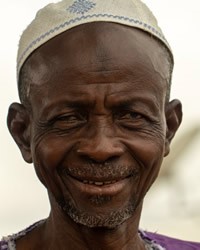Hausa in Nigeria

Photo Source:
Erik Laursen, New Covenant Missions
|
Send Joshua Project a map of this people group.
|
| People Name: | Hausa |
| Country: | Nigeria |
| 10/40 Window: | Yes |
| Population: | 40,247,000 |
| World Population: | 59,120,000 |
| Primary Language: | Hausa |
| Primary Religion: | Islam |
| Christian Adherents: | 1.70 % |
| Evangelicals: | 1.50 % |
| Scripture: | Complete Bible |
| Ministry Resources: | Yes |
| Jesus Film: | Yes |
| Audio Recordings: | Yes |
| People Cluster: | Hausa |
| Affinity Bloc: | Sub-Saharan Peoples |
| Progress Level: |
|
Introduction / History
The Hausa are the largest ethnic group in all of West Africa. The Hausa are originally from "Hausaland," a region covering 75,000 square miles and straddling the borders of Niger and Nigeria. From 1890 to 1960, Hausaland was divided into two sovereign states under French and British rule. After 1960, one became the Federal Republic of Nigeria, and the other, the Republic of Niger. There are smaller Hausa populations in other countries of West Africa.
The Hausa language is among the largest in West Africa. Because of their frequent contact with Arab traders, about one fourth of the Hausa vocabulary comes from Arabic. Hausa is written with Arabic script.
Some have wrongly assumed that Boko Haram comes from the Hausa because the term itself is from the Hausa language. But Boko Haram is mainly from Kanuri and Fulani as well as other tribes.
What Are Their Lives Like?
In comparison to some other African tribes, the Hausa have reasonable standards of health care, diet, shelter, electricity and education. However, life for the Hausa is still very difficult. They have a low literacy rate.
In marriage relationships, close relatives, preferably cousins are chosen as partners. Marriages are arranged, and ceremonies last for weeks. Everyone is to appear happy except the bride. In the village compounds, each wife has her own hut where she and her young children sleep. Often the husband has his own hut where the wives takes turns spending the night. In Nigerian terms, a woman is almost always defined as someone's daughter, wife, mother or widow and is given less educational opportunities than men. In fact, women are often confined to the home, except for visits to relatives and attending ceremonies. For the most part, women do not work in the fields but are responsible for preparing all the daily meals. There is a large population of single women, especially in the cities, due to the high divorce rate.
In their free time Hausa people enjoy festivals and sports. To celebrate harvests they have wrestling, stick fighting, and their own form of boxing called dambe.
What Are Their Beliefs?
By 1500, Islam had been introduced to the Hausa by traders. Many of the urban Hausa embraced it right away, in hopes of enhancing their businesses. However, the villagers were not as receptive to this new religion.
In the "holy wars" of 1804 and 1808, the Hausa were conquered by the Fulani, their strongly Islamic neighbors. They were made slaves until the early 1900s. At that time, many of the villagers were either forced or bribed into becoming Muslim. They adopted some of Islam's basic outward behaviors and rituals, but did not "sell out" as many of the urban Hausa did. For that reason, many of the rural Hausa today are only superficially Muslim. Eventually the Hausas and Fulani merged in West Africa, and the Hausa also became propagators of Islam.
Because Islam was carried throughout Africa by Hausa traders and priests, nearly everyone expects a Hausa to be Muslim. This could be one of the main reasons why the Hausa stay so resistant to the gospel. The Hausa culture is strongly linked to Islam, which makes it difficult to reach this people group with the gospel.
What Are Their Needs?
The Hausa culture is strongly linked to Islam, which makes it difficult to reach this people group with the gospel. There is a lot of prejudice against the Christians of southern Nigeria, and there has been intense persecution of the Christian Hausa.
Because Islam has been carried throughout West Africa by Hausa traders and priests, nearly everyone expects a Hausa to be Muslim. This could be one of the main reasons why the Hausa stay so resistant to the gospel. They have a full Bible and many evangelistic materials in their language, but few will give it a chance.
The Hausa also have physical needs such as education and safe drinking water.
Prayer Points
Pray that the Hausa would come to know Jesus, the giver of living water.
Thank God for the Hausa Bible! Pray for God's word to penetrate even the stoniest heart.
Pray for Bible studies and church planting movements to start among the Hausa people throughout Africa.
Pray for loving and dedicated workers to go to them with the gospel.